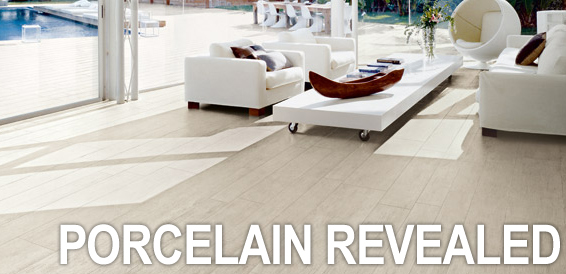Porcelain Revealed
There isn’t really any secret as to what a porcelain tile is: it’s a ceramic tile with an absorption rate of .5% or less. Incidentally, a .5% rating is also classified as “impervious”. This means impervious= porcelain, porcelain=impervious, impervious=< .5% absorption. However, all porcelains are not created equal. There are three general categories of porcelain tiles.
Natural porcelain tile
A.k.a. “technical porcelain”, “unglazed porcelain”, “unpolished porcelain”, or “through-body porcelain”. Natural porcelain is, as the name implies, porcelain that has not been glazed nor polished. These tiles are made of porcelain through and through. They can have surface treatments (soluble salts), have a different face and body (double loaded), or the face of the tile simply be a different color or texture than the body of the tile, yet it’s still classified as through-body “natural” porcelain. Most natural porcelain tiles have absorption ratings of less than .1%. Keep in mind that absorption has nothing to do with the facial surface being stain resistant. Unless the tile manufacturer has treated the porcelain to close up the surface (micro) porosity, you’ll need to seal natural porcelain tile before grouting.
Polished porcelain tile
Polished porcelains are natural porcelains with a polished surface. The polished surface isn’t a glaze, but actually comes from within the stone and it’s polished in a fashion similar to granite. It’s important to note that the polishing process on a porcelain tile actually opens up the pores of the tile. This means polished porcelain tiles must have a penetrating or impregnating sealer applied before grouting in order to increase resistance against staining and make them easier to keep clean.
Glazed porcelain tile
Many glazed porcelains are right at .5% absorption. However, if the bisque (clay body) of the tile is used as part of the visual design on the face of the tile the absorption should be under .1%. Glazed porcelains can be partially glazed, they can use glaze elements used in the manufacturing process or they can be completely glazed. There are even some glazes that can be polished!
Any type of porcelain tile has the following benefits when used residentially:
Design capabilities
When the manufacturer allows the bisque to show through the face of the tile, they can get a deeper, more realistic dimensions than ever before. To be honest, I would challenge any industry “expert” to correctly identify some porcelain tiles when compared to their natural stone counterparts once they’ve been properly installed.
Chip resistance
Through-body color porcelain tiles offer chip resistance in two ways. First, porcelain tiles have high mechanical strength and are extremely chip resistant. Second, if a through-body color porcelain tile does chip, the chip is the same color as the tile, so it doesn’t have to be replaced (unless the homeowner insists.)
Stain resistance
In the case of manufacturers who use glazes or use a process to close up the micro-porosity, the finished product will be extremely stain resistant, especially when compared to their natural stone counterparts.
Moisture resistance
If a tile has greater than .5% absorption it ISN’T porcelain. This means that all true porcelains are very dense and are ideally suited for use in high moisture settings. Whether you’re concerned about tile able to withstand freeze-thaw cycles or for use in swimming pools and spas, porcelain tile is a great choice.
Wear resistant
Natural porcelain is simply the hardest, most durable surface for high foot traffic installations. In floor areas in malls, grocery stores or banks, you just can’t beat the durability and beauty of natural porcelain.
Chemical resistant
All porcelain tiles are going to be much more resistant against citric acid, wine, mustard and other household chemicals than virtually any type of natural stone, including granite. This makes porcelain an ideal choice for kitchen counters and floors.
Cost
You can buy porcelain for less than natural stone; however, there are many porcelain tiles that will cost more than natural stone. However, keep in mind, that most porcelain tiles are technically superior overall to granite (the hardest of all natural stones) and many are virtually identical in appearance to natural stone.
Insight
Over the past 25 years porcelain tiles have a well-earned reputation as having the highest overall durability of all ceramic tiles or natural stones. The more you understand the features of this outstanding product, the more you can relay the benefits of owning porcelain to your customers.

